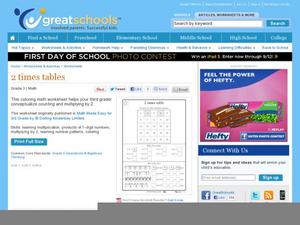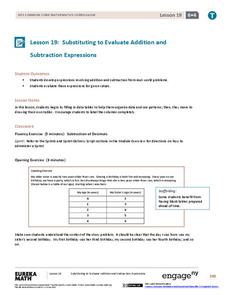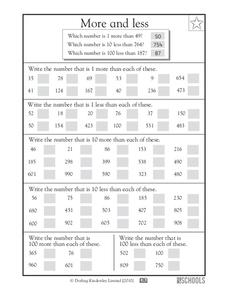Curated OER
Scanning Worksheet-Catullus 58
Your advanced Latin learners mark the metrical pattern in Catullus 58, a poem written by Catullus concerning his love and hatred of Lesbia. Spend time translating the poem so your learners have a complete understanding of the passage.
DK Publishing
2 Times Tables
Third graders count, multiply, and color their way to success. Not only do they practice multiplying two by various numbers, they color in a table to fully understand the two-times table, as well as counting sets of two ears on different...
EngageNY
Analyzing Residuals (Part 1)
Just how far off is the least squares line? Using a graphing calculator, individuals or pairs create residual plots in order to determine how well a best fit line models data. Three examples walk through the calculator procedure of...
Willow Tree
Approximating a Line of Best Fit
You may be able to see patterns visually, but mathematics quantifies them. Here learners find correlation in scatterplots and write equations to represent that relationship. They fit a line to the data, find two points on the line, and...
Curated OER
Reading Comprehension 7
Develop reading comprehension! With this resource, your kids will read a passage and focus on reading comprehension. There are a list of seven questions to answer after reading, but consider offering your class a specific strategy to...
It's About Time
How Electrons Determine Chemical Behaviors
Lead the class on an investigation as they play detective and locate patterns in the electron arrangement of atoms. During the seventh lesson, they assign valence numbers to elements, organize the periodic table in the correct sequence,...
EngageNY
Substituting to Evaluate Addition and Subtraction Expressions
Substitute this resource for what you used to use. Learners identify patterns in data tables and write addition and subtraction expressions to represent relationships. Substitution allows them to solve problems in context in the 20th...
Concord Consortium
Integer Solutions
Experiment with integer relationships. Young scholars consider integers that have a sum of 10. They begin with two integers, then three, four, and more. As they consider each situation, they discover patterns in the possible solutions.
Curated OER
Reading Comprehension 7: Level 12
A passage about the changing role of home economists provides the text for a reading comprehension strategies worksheet. Learners must summarize, draw inferences, identify the main idea, and use context clues to determine the meaning of...
Polk Bros Foundation
Preview Reading
Scanning a text before getting started is a reading strategy that your pupils can use to get a general idea about a text before diving in. Give some direction to their scanning with a worksheet that includes items to check for and space...
Curated OER
Isolation Worksheets
Designed to support learners on the autism spectrum or with Asperger syndrome, these worksheets will help you and your pupils to identify patterns of isolation they may be experiencing in their lives.
PBS
Working with Coordinate Planes: Activities and Supplemental Materials
Seven activities make up a collection of supplemental materials to reinforce graphing on a coordinate plane. Worksheet objectives include plotting coordinates within single and four quadrants, measuring straight and diagonal lines, and...
Read Works
Famous Inventors Alexander Graham Bell: You Rang?
Scholars read a brief informational text about the famous inventor, Alexander Graham Bell and his invention of the telephone, then show what they know by way of eight questions—six multiple choice and two short answer.
Curated OER
Multiples
A great worksheet for scaffolding critical thinking about mathematical concepts. This resource provides students with a brief explanation of multiples followed by 29 practice problems which gradually increase in difficulty. Several...
Ohio Department of Education
The Solution is Complex
Consider complex numbers, roots, and quadratic equations. Use the discriminate as a way to determine the nature of a quadratic's roots. Then discuss the similarities and differences between quadratics with two, one, or no real roots....
Curated OER
Joining Sentences
Sentence combining meets multiple objectives for writers, and they are all available in this informational text exercise. Learners read a mixed-up excerpt about the history of chess, putting 15 sentences into logical order. Have a...
Curated OER
Writing Numbers
How many letters? Budding counters determine and record the number of letters in five messages trailing behind planes. The write down both the numeral and the word form; the highest number here is 19. Next, pupils fill in two blank...
Curated OER
More and Less
Mental mathematicians add and subtract 1, 10, and 100 from sets of numbers. Each set of one, two and three-digit numbers gives scholars a chance to practice their addition and subtraction skills. There are 62 whole numbers in all. What...
DK Publishing
Multiply or Divide? Part 2
Explore the relationship between multiplication and division as scholars fill in these number sentences, each of which is missing a symbol. Is it a multiplication or division equation? There are 18 of these to start, all written...
DK Publishing
Numbers 1 to 20
Practice writing numbers with fun kites. Kindergartners will rise to the highest height as they match the numbers to their correct written forms: 11 to eleven, 14 to fourteen, etc. Use this resource as a class activity or as a review...
Curated OER
Choose the Operation: Plus or minus (up to 100)
Investigate the relationship between addition and subtraction as scholars fill in these number sentences, each of which is missing a symbol. Is it a subtraction or addition equation? There are 20 of these to start, all written...
US National Library of Medicine
Monster Genetics Lab
Harness young scientists' knowledge of genetics with an engaging science activity. Students start by flipping a coin to determine the genotypes and phenotypes of two parent monsters, before using Punnett squares to determine the...
It's About Time
Inferences of Waves
Building on the previous lesson, scholars use Slinkies to create standing waves. They graph waves on a calculator and then apply their knowledge to both sound and light waves. This is the fourth in a series of nine lessons.
Willow Tree
Factoring Polynomials
Young mathematicians discover trees organize more than just families — they help factor, too. The lesson begins with factor trees and develops slowly to factoring by grouping and special patterns.
Other popular searches
- Geometric Number Patterns
- Extending Number Patterns
- Fibonacci Number Patterns
- Math Number Patterns
- Number Patterns Worksheets
- Odd and Even Number Patterns
- Number Patterns in Math
- Ab Number Patterns
- Looking for Number Patterns
- Recognizing Number Patterns
- Number Patterns and Sequences
- Patterns Hundred Chart

























